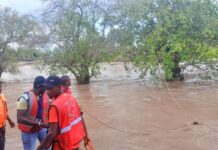
The Intergovernmental Authority on Development (IGAD) on Wednesday adopted the IGAD Regional Gender Strategy and Regional Action Plan on Women, Peace, and Security that will promote equality, inclusion, and empowerment of women in the region.
IGAD Executive Secretary Dr. Workneh Gebeyehu said the IGAD Gender Equality Strategy 2023-2030 sets the strategic framework for priority interventions in the implementation of IGAD Vision 2050 and builds on several ongoing Programs established to develop resilient ecosystems and economic growth.
He was speaking during the IGAD ministerial meeting for the adoption of the IGAD regional gender strategy and regional action plan on Women, Peace, and Security 2023-2030.
“Member State Ministers responsible for Gender united by adopting the IGAD Gender Strategy & Regional Action Plan. The Regional Policy instrument is a testament to our collective commitment to gender equality. Together, we are forging the path to positive change & regional transformation,” said Dr. Workneh.
“The launch of these instruments is closely linked to the increased opportunities within IGAD Member States for the representation of grassroots communities in governance and development,” he added.
Gebeyehu said the Regional Policy instruments were a testament to the region’s collective commitment to gender equality.
“However, as we celebrate these milestones, we must not overlook the challenges and opportunities in women, peace, and security within our region. Women and children are the most immediate and long-term victims of conflict, violence, and climate-related disasters,” said the IGAD Executive Secretary.
“We must also collectively deplore the structural, policy, and legislative obstacles that impede the realization of the shared aspiration of women’s empowerment,” he added.
At the meeting, Gender Cabinet Secretary Aisha Jumwa said the government of Kenya was committed to promoting gender equality, women’s empowerment, and the meaningful participation of women in all sectors of society.
“To this end, we have taken several crucial steps in the development and implementation of gender laws and women’s peace and security frameworks. Currently, we are implementing the Kenya National Action Plan (KNAP II) on women, peace, and security,” said CS Jumwa.
The IGAD gender strategy sets a roadmap that will guide in mainstreaming gender perspectives across all sectors, fostering an environment where women and other vulnerable groups can thrive.
“Women, peace, and security action plans reaffirm our dedication to promoting stability and security by recognizing the pivotal role women play in conflict prevention, reconstruction, and peacebuilding,” said the Gender CS.
“This gathering holds significant importance as we come together to review and adopt the gender and women, peace, and security strategies for the region,” she added.
Speaking at the meeting, UN Special Envoy for the Horn of Africa Hanna Tetteh said inclusion and empowerment of women will ensure women are active participants in matters relating to security and peace.
“When I talk about peace and security, I do not want you to see it purely from the lens of conflict, the idea is that we should be looking at peace and security from the lens of prevention. If as member states of IGAD and as a region, there can be a greater focus on prevention, trying to address the problem before it becomes a full-blown conflict, we would save ourselves a lot in terms of impact on our people and the devastation that conflicts can cause,” said Tetteh.
“But in situations where we do have conflict as is currently the situation in Sudan, we would want more women present in those peace processes because they also have a right to make their voices heard, in terms of what are the most important issues that need to be addressed to create stability within their country context,” she added.
Tetteh stressed on the importance of peace and security as conflict not only affects the people but also infrastructure which African countries spend a lot of money on.












